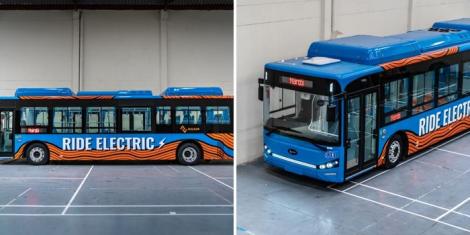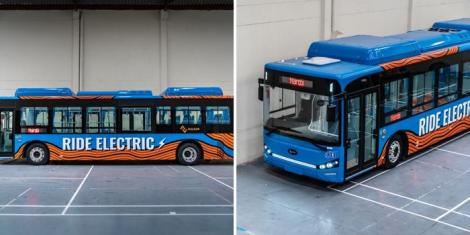Roam launches its first electric bus.
Roam has announced the launch of a new Mass Transit Bus, the Roam Rapid, which is specifically designed to address the unique challenges of public transport in Nairobi and Africa as a whole.


Roam has announced the launch of a new Mass Transit Bus, the Roam Rapid, which is specifically designed to address the unique challenges of public transport in Nairobi and Africa as a whole. It offers a solution for the growing number of cities implementing Bus Rapid Transit (BRT) systems across the continent and is the first of its kind in Kenya.
The electric buses have a capacity of 90 passengers allowing ample room and efficient boarding and disembarking of commuters with both seating and standing areas. They also feature priority seats catering to different age groups and commuters, including the elderly and those with limited mobility. Other characteristics include extended legroom, designated areas for wheelchairs, and a low-floor entry for easy access.
Roam buses which will officially start plying different routes on Wednesday, August 24, have a range that enables the operators to run their buses for a full day without having to worry about range anxiety. The bus has the ability to fully charge in less than 2 hours through DC charging ports. Giving operators full flexibility to decide their charging and operating schedule, either fully charging at night or including a brief midday charge to top up the battery.
The launch of the electric bus is a step towards realizing Opibus's goal of electrifying Africa's public transport system and deploying products tailored for the local use case. The bus is designed and developed in-house with local engineering talent, while at the same time utilizing local manufacturing partners.
The key to the technology is the Opibus proprietary electric vehicle platform, which is modular and can be the foundation for several types of vehicles. This enables the creation of a suitable bus for the African use case, in terms of its reliability, durability, and price point. This also means local and global contract manufacturers can be used to create a globally competitive product, with a rapid scale-up.
This bus will be significantly lower cost than importing fully built electric buses. However, it also has superior performance compared to its diesel counterpart. With the installation of a powerful motor, the bus has maximum torque which improves performance while enabling the driver to accelerate more responsively. Additionally, since the electric bus does not have a combustion engine or manual gearboxes, there are no oil/filters/gaskets that need to be changed. This translates to an 80% reduction in maintenance expenses, compared to a diesel bus. Taking into account the electricity charges which are also significantly lower than the ever-increasing diesel price, the total operating costs are lowered by 50%. They will revolutionize the public transport sector in Africa.
“This first electric bus is set to be launched commercially mid-this year. Following this, the platform will be tested at scale in commercial deployment of 10 buses during the second half of 2022. In doing so, we ensure that we gather valuable feedback to continue the development of the product for an optimized market fit. It feels great to be the first movers in this very exciting space” - Dennis Wakaba, Project coordinator - Public Transport
The deployment of the buses will initially be in peri-urban areas around Nairobi Metropolitan, paired with a business model that enables operators to save from day one. Along with the bus deployment, several charging points will be installed from Opibus' already existing range of products. These chargers will be a mix of AC (slow) and DC (fast) chargers, using the fast charger, the electric bus will be fully charged within an hour enabling seamless operations.




